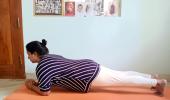To effectively lose fat, particularly around the abdomen, try a balanced approach that incorporates both cardio and strength training, suggests rediffGURU Dr Shakeeb Ahmed Khan.
- You can ask rediffGURU Dr Shakeeb Ahmed Khan your questions HERE.

Are you trying to lose weight around your belly?
Do you wake up with a stiff neck and pain in your joints or knees?
Dr Shakeeb Ahmed Khan, a consultant physiotherapist with over 12 years of experience specialising in orthopaedic and paediatric physiotherapy, has served as a technical consultant for the World Health Organisation, the United Nations, the Tata Institute of Social Sciences and several national and international NGOs.
Besides physiotherapy, he is keenly interested in disability management, early intervention, geriatric care and assisting children with disabilities.
- You can ask rediffGURU Dr Shakeeb Ahmed Khan your questions HERE.
Anonymous: Hi sir, I am male 27 years, planning to reduce my current weight of 86 kg hence planning to hit the gym.
I am concerned about abdominal fat.
I left gym three years ago when my weight was average 69 kg. However due to no physical activity, my weight increased.
Now I am planning to reduce weight and also improve my strength with good muscular lean body, not bulk.
Please guide me sir. Thanks
It’s wonderful that you’re enthusiastic about getting back into the gym to work towards weight loss and a lean, toned physique.
As a physiotherapist, I suggest scheduling regular check-ins with a physiotherapist to monitor your progress and make any necessary adjustments to your exercise routine.
- To effectively lose fat, particularly around the abdomen, while building muscle, try a balanced approach that incorporates both cardio and strength training.
- Start with 20 to 30 minutes of moderate-intensity cardio -- like brisk walking, cycling, or jogging -- three to five times per week to increase calorie burn.
- For strength training, focus on compound exercises such as squats, lunges, push-ups and rows, with three sessions per week.
- Begin with lighter weights, increasing gradually as your strength builds and focus on good form to develop lean muscle without bulk.
- Including core exercises like planks, Russian twists and leg raises will help strengthen and tone your abdominal muscles; however, remember that fat loss from specific areas requires overall body fat reduction.
- A high-protein, balanced diet is crucial for supporting muscle growth and managing hunger, so aim to reduce processed foods and sugars.
- Consistency is essential. Maintain a regular exercise schedule and ensure you have rest days for recovery. With dedication, you’ll see steady improvements over time.
Best of luck and don’t hesitate to reach out if you need further guidance.
Mahboob: Hi sir, I've been having neck and lower back pain and my MRI shows bulges in my neck and lower back discs.
I've been going to physiotherapy sessions for five years, but I haven't seen much improvement.
During sleep, it's become unbearable to sleep on my back because of a huge amount of pain.
When I get up, it'll be fine in 1 hour.
I'm using a curvy neck pillow, a medicated bed and I've tried sleeping on the floor without a bed, so please tell me how to get rid of this?
Dear Mr Mahboob, I'm sorry to hear about your ongoing discomfort.
Disc bulges in the neck and lower back can be tough to manage but consistent care can make a difference.
Alongside physiotherapy, incorporating daily gentle stretching and strengthening exercises is essential to relieve pressure on the discs.
Small adjustments to your medicated bed or neck pillow, recommended by your therapist, might also improve sleep comfort.
Be mindful of your posture throughout the day and consider ergonomic support, especially while sitting.
Before bed, try a hot or cold pack to help relax muscles and ease pain.
For long-term relief, managing stress, maintaining a healthy weight and avoiding high-impact activities will help protect your spine.
While disc conditions are chronic, steady, small steps like these can greatly improve quality of life. Wishing you quick recovery.
Rdy: I got knee pain.
Movement of legs is free but when I try to step, at a specific spot I am getting pain.
Thank you for your query.
It sounds like your knee pain occurs primarily at a specific spot when stepping, which can often be due to localised issues like tendon strain, ligament irritation or cartilage sensitivity.
Consulting a physiotherapist would be beneficial as they can assess the exact location and cause of your pain.
They'll also provide targeted exercises and possible therapies to manage the discomfort and strengthen your knee in a way that supports pain-free movement. Wishing you quick recovery.
- You can post your questions to rediffGURU Dr Shakeeb Ahmed Khan HERE.
Disclaimer: All content and media herein is written and published online for informational purposes only. It is not a substitute for professional medical advice. It should not be relied on as your only source for advice.
Please always seek the guidance of your doctor or a qualified health professional with any questions you may have regarding your health or a medical condition. Do not ever disregard the advice of a medical professional, or delay in seeking it because of something you have read herein.
If you believe you may have a medical or mental health emergency, please call your doctor, go to the nearest hospital, or call emergency services or emergency helplines immediately. If you choose to rely on any information provided herein, you do so solely at your own risk.
Opinions expressed herein cannot necessarily provide advice to fit the exact specifics of the issues of the person requesting advice.












 © 2025
© 2025